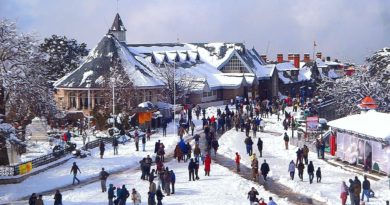Flirting with Ghosts of the Past – Fathepur Sikri
Four centuries ago, Emperor Akbar travelled to the sleepy little village of Fathepur Sikri to seek divine intervention from the sufi saint Salim Chisti who lived there. The greatest of the Mughal rulers had, till then, failed in one aspect – none of his three official wives could bear him an heir; that was till the holy man prophesied that he would be blessed with three sons. Within a few days, one of his queens gave birth to a male child who was named Salim after the saint. (The boy would later grow up to become Emperor Jehangir) A few months later, Akbar was the proud father of two more sons.
And Akbar said thank you as only an emperor can by building a great mosque (the 176 ft Buland Darwaza that leads to this shrine is the loftiest commemorative gate in India) that would transform the small hamlet of stone cutters and weavers forever. For it was here that Akbar also decided to build a magnificent city that served as his capital for 15 years.
During this period, the palaces that dotted the new citadel were strewn with silk pillows and carpets. Perfumed water gurgled under the floor of the royal apartments to keep them cool. There were elaborate baths and formal gardens as also statehouses, public and private audience halls, delicate stone screens, a treasury brimming with gold, silver and precious gems… During its days of glory, the buildings of Fatehpur Sikri were inlaid with marble and semi-precious stones that reflected the dying rays of the setting sun; a phenomenon that convinced the first Englishman to visit the complex that the entire city was up in flames.
Today Fatehpur Sikri lies stark and austere for much of what Akbar had built is gone. However, what remains of the sandstone bastion – the five story Panch Mahal, Akbar’s private audience chamber, the palaces of the queens, the treasury and the central courtyard suspended over a pool of water are still awe-inspiring.
At Fatehpur Sikri, it is hard to get away from Akbar for he was the focus of all activity; his imperial duties and personal enthusiasm dictated every aspect of the city’s varied life. His energy was inexhaustible (he slept for only three hours a day). Although illiterate, he maintained a library stacked with around 24,000 manuscripts and had a relay of scholars read aloud to him. As a patron of the arts, he surrounded himself with all the available talent in the land and while most conquerors looted the treasuries of the vanquished, Akbar stole the best minds and artists from his foes. Tansen, the fabled musician whose voice could squeeze tears from animals and rain from the sky, was brought to Akbar’s court as a part of the settlement with the defeated maharaja of Rewa.
Here one still fells the pangs of a beautiful dream that had run dry, and literally so. In 1585, Akbar had to abandon his capital city because of a lack of water thus bringing down the curtain on its golden era. Time and vandals stripped it of its glory till the Archaeological Survey of India stepped in to salvage what was left.
But if you listen carefully you might hear the sound of drums that kept the citizens of Fatehpur Sikri clued in about the activity of Akbar during the day. Different rhythmic beats told them if he was bathing, eating, presiding over the royal court, holding a private audience… And when they fell silent, the entire citadel wondered which queen or consort was sharing his bed. For at Fatehpur Sikri the past lies buried behind the sounds of tourists, pilgrims and guides who have overrun the city.
Fact File The nearest airport to Fatehpur Sikri is at Agra (40 km). It is also within striking distance from Delhi and Jaipur. Fatehpur Sikri, a UNESCO World Heritage Site, falls within the golden triangle of Delhi, Jaipur and Agra. Bharatpur Bird Sanctuary is 25 km away.
There are a few small hotels in Fatehpur Sikri, including UP Tourism Development Corporation’s Gulistan Tourist Complex and an Archaeological Survey of India Guest House.
